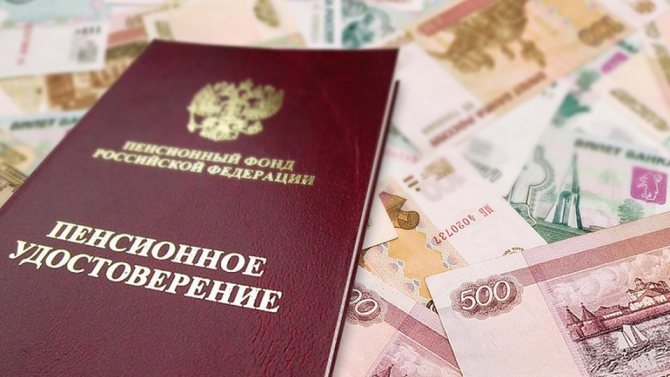Who is entitled to the thirteenth pension?
The provision of 13 pensions in 2020 was planned for senior citizens who receive monthly financial support from the state. This measure was proposed as an insurance measure to increase the level of well-being in the country.
Important! The future bill did not indicate other grounds for issuing additional payments. Therefore, whether there will be a 13th pension in 2020 for disabled people remains unknown.
The procedure for its registration is similar to the usual one - there is no need to collect additional certificates and documents. You also do not need to contact the Pension Fund branch with an application. It is possible that the 13th pension for pensioners in 2020 will be issued individually, through Russian Post employees, through delivery by a postman, or even by transfer to a plastic card.
Will the thirteenth pension project be accepted in December 2020?
The date of the 13th pension for 2020 was recently discussed at one of the State Duma meetings by the United Russia party. The proposal was sent for processing by representatives of a tripartite commission, which included deputies, employers and trade unions. It was also stated that the Russian authorities made a number of adjustments regarding the insurance period.
Elena Smirnova
Pension lawyer, ready to answer your questions.
Ask me a question
Most likely, there will be a negative response to the introduction of 13 pensions for pensioners in 2019, and the project will be closed permanently.
The reason for this, according to deputies, is this: in the next three years, the State Duma of Russia plans to reduce by 13 percent the costs of providing financial benefits for old age. Most of all they are inclined to the option of indexing material support.
What changes can retirees expect in 2020?
Pensions were perhaps one of the most pressing topics of 2017. The government has continually promised to increase the amount of payments to Russian elderly people. The long-awaited moment has come. Officials reported that old-age pensions will increase by 3.7% from January 1, 2018, the average increase will be 500 rubles. If in 2017 the average pension was 13.8 thousand rubles, then in 2018 it will increase to 14.3 thousand rubles. Almost 40 million non-working pensioners will begin to receive increased pensions. As experts explain, and not only economic ones, in this way the government is trying to “appease” older citizens - the main electorate before the presidential elections, which will take place in March 2020.
Meanwhile, while some pensioners are waiting for the indexation of payments, others - those who are just about to join this category of citizens - are faced with problems. Some Russians simply cannot prove their work experience.
Do you want a pension? Prove that you worked!
“Two years ago it was time for me to apply for an old-age pension. I didn't expect any difficulties. She was born and worked all her life in Moscow, in reputable organizations. 33 years of experience. All records in the labor record are present and stamped. I have had SNILS since 1997. Well, I collected the papers and made an appointment through the website of the Russian Pension Fund for a specific day and time. I asked to take time off from work. She came,” says Muscovite Natalya Zlobina.
At first, the woman naively hoped that the whole procedure would take no more than an hour, but she was deeply mistaken. Having crossed the threshold of the Pension Fund of Russia branch, the future pensioner was faced with a “live queue”, which she had probably not stood in since Soviet times.
However, this was just the beginning of an epic called “registration of a pension.” When it was our heroine’s turn, the employee of the pension department flatly refused to count the woman’s 8 years of work into her work experience. “You have a stamp here in 1994, and it says: “USSR State Committee for Publishing, Printing and Book Trade. Publishing house "Russian language". And in 1994, the USSR no longer existed, which means the seal is invalid and the record of your work is also invalid.”
The official ignored all arguments that when Zlobina began working in the organization, the Soviet Union still existed. "What to do? The publishing house no longer exists,” lamented the failed pensioner. There was only one way out: to seek confirmation of one’s work in that very organization. But this was not so easy to do. The woman spent several more months trying to find her ends. However, all our heroine’s attempts to defend her right to a pension were unsuccessful. The Federal Property Management Agency, where the archives of the Russian Language publishing house, liquidated 8 years ago, were transferred, did not provide the documents.
Many retirees face similar problems. “The luckiest ones are those whose Soviet organizations have not evaporated. A friend worked in the Lenin Library in the nineties - the same story with the press. But the library still exists, she goes there, receives confirmation and a large pension. Lucky case!" - says Zlobina.
Sometimes the situations observed were simply anecdotal. For example, in the nineties a woman worked at the Kniga publishing house, which no longer exists. After the letter to the Federal Property Management Agency, she, like Zlobina, received nothing. And six months later, a call came from Odintsovo in her apartment.
- You know, I have a letter with your documents, there is a copy of your passport and work permit, all your personal data, address, telephone number, passport photo. And we are just private individuals. But for some reason, packages from the Federal Property Management Agency are always sent to our postal address. We have nothing to do with this! Pick up your package, there is a lot of information about you there! - said on the other side of the telephone wire.
The woman went to Odintsovo, took a letter-package with her documents, and at this point her attempts to confirm her work experience and her pension stopped.
“I gave up too. I tried to provide the Pension Fund with my preserved official ID, which confirmed that I did work at the magazine. I brought there the copies of the magazine itself, where in each issue the editorial staff is printed, including “Department of Literature and Culture - N. Zlobina.” Where are my publications? It was not possible to prove to the Pension Fund that I worked in the magazine,” complains Zlobina.
As legal partner Maxim Pletnev explains, in the case of the “USSR” seal, it is necessary to obtain a written refusal and appeal it in court. “Even if there is no refusal, you can appeal against inaction. And, turning to a specialist, prove that you are right. Documents on labor relations are stored by law for 75 years and can be found in the city archive (if Moscow) or in the district archive, if in the region. Searching within the organization itself may be completely futile. In such situations, it is better to turn to specialists for qualified help,” the lawyer notes. True, before contacting a specialist, you should evaluate the financial benefits and losses. The fact is that in the end, the cost of a lawyer’s services may exceed the possible effect of an additional increase in pension.

The funded part of the pension as a panacea for the crisis
Meanwhile, while some Russians are fighting for their right to a pension, others are thinking about how not to lose their savings. And the population has plenty of reasons to be worried. As we all remember, in 2014 the government announced a moratorium on funded pensions. Simply put, citizens were deprived of part of their money set aside for old age. As officials explained, this was required by the state of the domestic economy. Due to the crisis, contributions from working citizens to the Russian Pension Fund (PFR) have sharply decreased, and its obligations to pensioners, on the contrary, have increased. As a result, a “hole” was formed in the Pension Fund, which could only be covered by a trillion-dollar transfer from the federal budget. However, there was no money there either: oil prices fell, and treasury revenues collapsed along with them. Therefore, the government did not come up with anything better than to put its hand into the funded part of pensions, that is, the “hard-earned” citizens were simply “expropriated” and used to pay the current elderly people.
Moreover, the officials swore that as soon as things started to improve in our economy, the savings would immediately be returned to their owners. However, these words remained words: the freeze was extended from year to year: in 2015, and in 2016, and in 2017... And in December 2020, Vladimir Putin signed a law according to which the moratorium was extended until 2020 . And this despite the fact that, according to the Ministry of Economic Development, GDP growth in 2020 will exceed 2%, and inflation will even reach its minimum values - below 3%.
Officials explain the extension of the moratorium on pension savings by saving budget funds - over 300 billion rubles a year. True, government speakers for some reason are silent about how much the economy will lose from the fact that “long-term” money does not work in it. Meanwhile, according to the Association of Non-State Pension Funds (ANPF), during the freeze they have already lost 1.5 trillion rubles. Moreover, by 2020 losses will amount to 6 trillion rubles. And if the pension system is not reformed before 2027, then losses will amount to up to 19 trillion rubles, warn the ANPF.
By the way, in recent years the government has been actively discussing ways to reform the pension system. In particular, the Ministry of Finance, together with the Central Bank, proposes to continue the formation of the funded part of the pension, but only on a voluntary basis - through new contributions from the citizens themselves. That is, the employer will pay 22% to the mandatory insurance part of the pension, and the employee himself will decide how much more money from his salary he is willing to transfer to individual pension capital (IPC). According to the new pension system, citizens will automatically subscribe to contributions to non-state pension funds (NPF).
“But if there is no reform of the pension system, and individual pension capital is not introduced, or its introduction is not so successful, the economy will lose a fairly large amount of “long-term” money, and the pensions of Russians will continue to depend on the capabilities of the state budget,” - warns the head of the ANPF analytical service, Evgeniy Biezbardis.
How to save for old age
By the way, non-state pension funds themselves also suffer from the freezing of the funded part. The fact is that the total contribution to the pension system is 22%. Of this, the employer sends 16% to the Russian Pension Fund (PFR), from where this money is already used to pay current pensioners. The remaining 6% was credited to individual accounts, the owners of which could independently manage these funds. As a rule, people placed them in non-state pension funds or private management companies. In this case, the money did not just lie dead weight “under the mattress”, but brought income to its owner, as well as the profit of the non-state pension fund.
However, since the government announced a moratorium on the funded part of pensions, the funds have lost their financial source. And now, in order to increase profits, NPFs are forced to resort to increasing their client base. And here they do not hesitate to use any means to lure a potential client. And often fraudulent. For example, at the end of 2020, NPFs began disseminating information that starting from the New Year, all pension savings in the Pension Fund would be burned out, and the authorities would spend the pensions of future pensioners on payments to current old people.
Frightened Russians immediately began to sign proposed agreements to transfer from the Pension Fund to the Non-State Pension Fund, so as not to allegedly lose their funds. However, in the end, everything turned out the other way around. As the Pension Fund of Russia explains, there is a rule: citizens can change their pension fund without monetary loss only once every five years. Those who do this more often are not paid income from the investment of their savings in 90% of cases. This money goes to the “old” fund. “You must sign an application for an indefinite transfer of your pension savings five years from the year when the insurer was last changed, when the entire amount of pension savings, including investment income, is transferred. If a person makes a so-called “urgent transfer” every year, then in ten cases out of a hundred there is a partial or complete loss of investment income,” explains Margarita Nagoga, head of the PFR Public Relations Department.
According to the auditor of the Accounts Chamber, Vladimir Katrenko, losses could amount to up to 500 thousand rubles per person. “In general, citizens’ losses amounted to more than 40 billion rubles,” notes Anatoly Aksakov, chairman of the State Duma Committee on Financial Markets.
As practice shows, citizens often do not know these nuances. The funds that NPFs have accumulated are quite significant. Today, non-state pension funds manage 2.4 trillion rubles of pension savings. And in the expanded portfolio of the VEB state corporation, which now houses the funds of the “silent people,” there are 1.8 trillion rubles.
It is expected that the work of the NPF will be streamlined by the corresponding bill, which should come into force in January 2020. According to the document, the period of mandatory stay in a non-state pension fund should be reduced to at least three years. In addition, it is proposed to establish a rule that would introduce liability for non-state pension funds, which in every possible way push citizens to move from one fund to another, but do not inform them that they will lose money in the process.
Experts believe that the savings of future pensioners will be preserved most productively if the application to withdraw from the fund is submitted not to the future insurer, as is the case now, but to the current one. In this case, the insured person must be notified of possible losses. This would reduce the activity of unscrupulous agents, whose remuneration often depends not on the quality of advice, but on the number of contracts for compulsory pension insurance.
However, citizens themselves should be more vigilant: they need to consciously choose where to place their savings. At the same time, never tell anyone your SNILS unless you are sure that this is a representative of a government agency or an employer. And also do not indicate it on Internet sites: scammers can use this information.
Read the material: Russians began to be denied pensions due to lack of points










